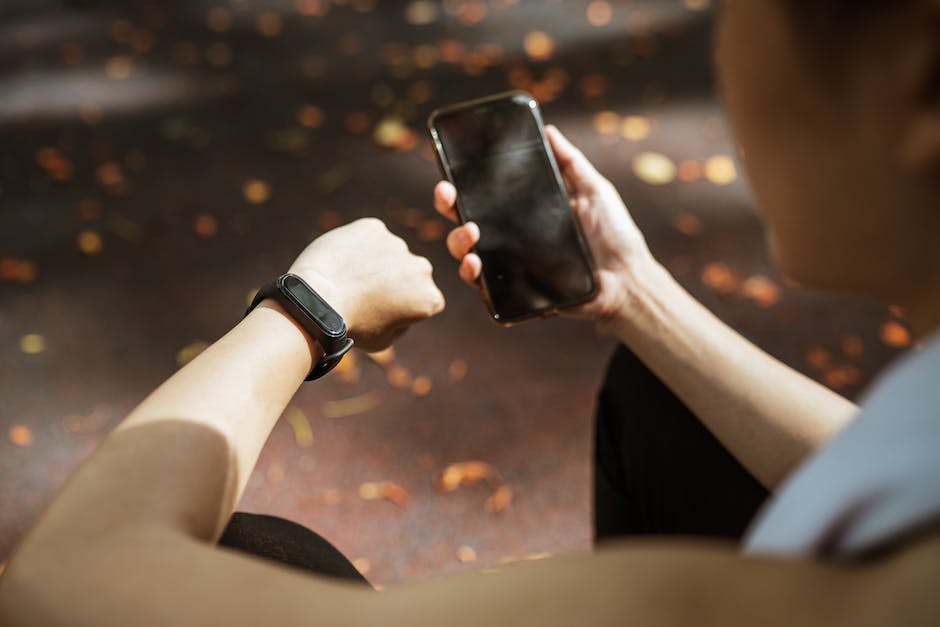Do Fitness Trackers Really Deliver Accurate Results?
Are you considering buying a fitness tracker but you’re not sure it will deliver accurate results? Then this article is for you! Even though fitness trackers have become insanely popular, the question remains – can they actually track our activity and calories accurately? Let’s take a closer look and see whether or not they really live up to expectations!
List of Content
- 1. What is a Fitness Tracker?
- 2. The Accurate Data Promised- But Is It Real?
- 3. Factors That Influence Accuracy
- 4. Pros & Cons of Fitness Trackers
- 5. Are Fitness Tracker Results Useful?
- 6. What are Some Alternatives?
- You Ask, I answer

1. What is a Fitness Tracker?
Fitness trackers are wearable devices that can help you keep track of your fitness goals and improve your activity level. They are ideal for tracking your overall well-being, physical activity, and heart rate.
- If you’re looking for a way to monitor your activity, a fitness tracker can act as an assistant that provides you with live statistics, such as steps taken, distance travelled, and calories burned.
- Some fitness trackers also offer more advanced features, such as a heart rate monitor, sleep tracking, and the ability to track your nutrition.
- Fitness trackers are the perfect device for people who are trying to stay active and motivated. By having the data right at your fingertips, you can easily stay on top of your goals and monitor your progress.
You can find fitness trackers at any major electronics store, or online. There are a variety of brands and models to choose from, depending on your needs and budget. The best fitness tracker will depend on your personal fitness goals and lifestyle. When selecting a fitness tracker, it’s important to consider features like accuracy, battery life, and the type of data that is available.

2. The Accurate Data Promised- But Is It Real?
Gathering Data
Data is the new currency of modern times, but the integrity of the data is often questionable. Companies have been using automated methods to gather data and make decisions based on this data. Oftentimes, the AI used in gathering data may not recognize outliers in the data, leaving the data inaccurate.
Data Quality
Many companies are focusing on data quality as they realize that bad data leads to bad decisions. Companies must ensure that the data they are gathering is accurate, which means double-checking data frequently using both automated and manual methods.
Data Verification
Data must also be verified after it has been gathered. It is important to run tests on the data, to check for accuracy, and to use techniques like data mining to check for any anomalies. This will ensure that the data is accurate and can be trusted.
Data Standards
Another way to ensure data accuracy is to adhere to data standards. Companies should have standards in place for the data they collect, so that it is accurate and up-to-date. This will help them ensure the accuracy of their data and make sure that they are not making decisions based on inaccurate information.
- Gathering data
- Data quality
- Data verification
- Data standards
3. Factors That Influence Accuracy
Creating accuracy while working with data can be challenging but, when done right, will benefit immensely. Here are some of the main factors that could influence accuracy:
- Technology: using the right set of tools, techniques and methods can bring out the most accurate results. This includes enabling machine learning algorithms, leveraging data streaming technologies and applying advanced analytics.
- Data Quality: data quality vary from source to source and factors in playing a vital role while measuring accuracy. Processing poor quality data can lead to errors, while high-quality data improves accuracy.
- Data Interpretation: the way the data is interpreted can also be a factor influencing accuracy. If the interpretations of data are wrong, so will be the results.
- Parameters: choosing the right parameters for a data analysis method is essential for accuracy. Variation of parameters can lead to different outcomes on the accuracy.
Process Optimization: data accuracy can be improved by optimizing the ETL process and data normalization. The data cleaning process helps avoid errors and by being more efficient, accuracy increases.
Data Transformation: selection and transformation of data is a significant factor in capturing the accuracy. For that, real-time streaming and timely analysis of data can be beneficial.
Data Collaboration: collaboration with multiple stakeholders and data scientists when working on data can bring more transparency and aids in developing interconnectivity among different networks to get the best and precise results.
4. Pros & Cons of Fitness Trackers
Advantages
- Fitness trackers are a great way to keep track of your daily activity levels and measure your progress towards achieving fitness goals.
- Many fitness trackers have additional features such as heart rate monitoring or calorie counting, which can help you more accurately achieve your goals.
- Many fitness trackers can sync with apps such as MyFitnessPal, which makes tracking your diet and exercise easier and more convenient.
Disadvantages
- Fitness trackers can be expensive, and some models can lack features that other trackers have.
- The accuracy of some features such as heart rate monitoring can be questionable, depending on the model.
- Some trackers require a lot of energy to use, which can be a problem for people who are not used to having electronic devices attached to them constantly.
Conclusion
Overall, fitness trackers are a great tool for measurement and motivation, but it’s important to consider your budget and your lifestyle before buying one. Do your research and choose the model that best suits your needs.
5. Are Fitness Tracker Results Useful?
Fitness trackers are certainly appealing. They boast long battery lives, come in stylish designs, and provide all kinds of valuable data to help you stay in shape. But are the results generated by fitness trackers actually useful? Here’s a closer look at this technology.
Accuracy of Results
Accuracy of fitness tracker results is an important factor to consider. Generally speaking, most trackers are fairly accurate – typically within 5–10% of actual values. Nevertheless, some conditions (like sweat or temperature) can affect the accuracy of certain readings. So it’s important to know the limitations of any device you are using.
Tracking Steps
Most fitness trackers can track your steps and report them back to you. This is a great way to keep track of how many steps you take each day and make sure you are getting enough physical activity. However, it’s important to remember that step count is only one part of an overall exercise program. You should also take into account time, intensity, and type/variety of activities.
Heart Rate Monitoring
Many fitness trackers come with a heart-rate monitor, which can be very useful for tracking your progress when exercising. Real-time heart rate data can also be helpful in guiding you to safely push yourself during workouts. However, it is important to note that this type of data can be affected by various factors, such as age, fitness level, and even the weather.
Other Benefits
Fitness trackers have a lot to offer, beyond tracking steps and heart rate. Many modern devices come with additional features, such as:
- Hydration & Body Temperature
- GPS Tracking of Routes & Locations
- Sleep Tracking & Analysis
- Social Features & Community Support
These features can be great for getting a more comprehensive view of your health. For instance, if you’re trying to make improvements such as losing weight or increasing your performance, tracking data from all of these areas can provide a useful insight into your progress.
6. What are Some Alternatives?
Negotiation and Conflict Resolution
For those that would rather not go down the litigation route, there are other options available when looking for a resolution to a dispute. Negotiation and conflict resolution processes can provide a way of finding a compromise between the two parties, and may be more cost effective in comparison to legal action.
Negotiation requires two or more parties with conflicting interests to come together and attempt to reach an agreement. All negotiations should start with each side clearly expressing their position on the issue, and from there both parties should thrash out the best possible solution. This should involve each side agreeing to something that both sides find satisfactory.
Mediation requires the services of an impartial mediator to work with the two sides to try and reach a resolution they are both happy with. It is important to remember the mediator is not a judge, but an advisor instead. They have no ability to impose any solution on either party, but can help them to work together to come up with a solution.
Arbitration is similar to mediation, but in this case the third-party (an arbitrator) is in control of the proceedings, and they have the power to impose a solution on the two parties. This is a much more formal option than negotiation or mediation, and is suitable for disputes where more complex legal issues or high monetary amounts are involved.
- Negotiation
- Mediation
- Arbitration
You Ask, I answer
Q: What is a fitness tracker?
A: A fitness tracker is a device that measures your physical activity level such as steps taken, stairs climbed, calories burned, etc. It also provides feedback about your overall activity and fitness level, helping you stay on track with your fitness goals.
Q: Are fitness trackers accurate?
A: It depends on the specific model and how well it is calibrated. Generally, fitness trackers provide fairly accurate information about your physical activity level, but there is always a possibility of some errors or inaccuracies.
Q: How can I make sure my fitness tracker is providing accurate data?
A: Make sure to consult the instruction manual for your device before using it. Additionally, often times fitness trackers require you to input your weight or age in order to produce the most accurate results. Moreover, calibrating the device after any significant change in your physical activity level is necessary to get the most accurate results.
It’s pretty clear that fitness trackers are not perfect, and in some cases their accuracy can fall short. However, there are a number of advantages to wearing them, including increased motivation and convenience. If you’re serious about tracking your fitness, device accuracy should be a priority—but it shouldn’t be your only factor of consideration. Only you can decide if a fitness tracker is a worthwhile addition to your fitness routine.

